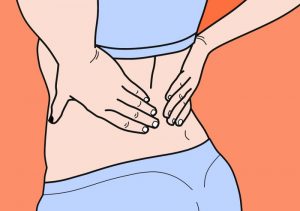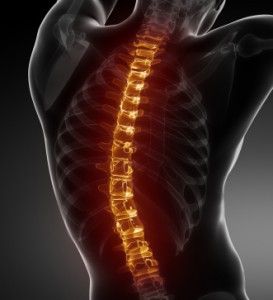Everyone experiences some degree of discomfort in their spine — that’s the nature of being human. Eons ago when our ancestors started walking upright, they brought with them a four-legged creature’s backbone, and our backs haven’t evolved much since. Modern changes to how we live and work haven’t done much to help the strength and stability of our spines. Thus, back pain has become a part of the human condition.

Yet, not all back pain is created equal. If you suspect you might be suffering from something a little more serious than the run-of-the-mill discomfort, read on to find out for sure.
When Your Pain Is Sudden-onset
Usually, back pain increases gradually over time. This is an indication that the soft tissues in your back are inflamed, wearing down or otherwise in desperate need of rest and ice. However, if your pain went from zero to 60 in a matter of minutes, you need to see a doctor, stat.
While slow-onset back pain can also be a cause for concern, one that requires medical intervention from a place like The Heilman Center for Pain and Spine Care, back pain that pops up out of the blue is a sign that something has gone seriously wrong especially quickly. You could have torn a muscle or ligament, slipped or herniated a disk or caused some other traumatic injury that needs immediate medical attention. You’d be better to be safe than sorry and head to the hospital right now.
When Your Pain Is Chronic
Chronic back pain is defined as back pain that persists for 12 weeks or longer, after the initial cause of the pain has been treated. Even minor back injuries take a long time to heal, but once they heal, you might continue to experience discomfort for some time. If the discomfort lasts longer than three months — congratulations, you’ve reached chronic status.
Chronic back pain — like any kind of chronic pain — isn’t well understood. In many cases, chronic back pain is as much due to psychological factors as physical ones. You should talk to a medical professional to understand what might be causing your chronic pain and develop a treatment plan that fits your lifestyle and needs.
When Your Pain Isn’t Severe
Severe back pain can be scary — what if you did slip or pinch a disk, or what if it means you have an autoimmune disease or even cancer? — but the truth is that severe back pain is rarely a major cause for concern. Most often, the worst problems with your back produce the mildest discomfort, which is why you should always double-check with a doctor when you experience discomfort for a prolonged period of time. This isn’t to say you should rush to the emergency room whenever you feel a twinge, but if there is a pattern of pain or discomfort in the same parts of your back, it is worth an investigation.
Even so, if your back pain is so intense that it prevents you from engaging in everyday activities, like work, exercise or social events, you should also get medical help. Likely, they’ll prescribe a mild pain killer and give you precise instructions for how to heal your back quickly.
When Your Pain Comes With Other Symptoms
When back pain results from a muscle strain or mild spinal compression, pain and weakness will typically be your only symptoms. However, when back pain is something more severe, other systems in your body will be affected, so other symptoms will pop up. Some bad signs include:
- Fever. This could indicate that your back pain is due to some sort of infection, perhaps a kidney infection.
- Numbness or tingling. Anytime you feel numb or tingly, there is something awry with your nerves. Because your back contains your spinal column, the major highway for your nervous system, you could feel numb or tingly anywhere on your body and have it be the result of nerve irritation or damage in your back.
- Bowel or bladder disfunction. The lower part of your spine controls the lower part of your digestive system, so pain accompanied by bowel or bladder trouble isn’t good.
- Nighttime pain. Most back pain occurs during the day, when you use your back. If the opposite is true with you, it could be a sign of cancer.
- Unexplained weight loss. This, too, could be a sign of infection or tumors.
- Medical history. If you have a history of cancer, osteoporosis, suppressed immunity or even IV drug use (to include steroids), you should see a doctor as soon as you feel back pain.
Back pain is something that unites the human race — but it doesn’t have to be something you suffer through interminably. Pain is always a sign that something is wrong, so you should pay attention to your body to better understand what it needs to feel better.



Leave a Reply